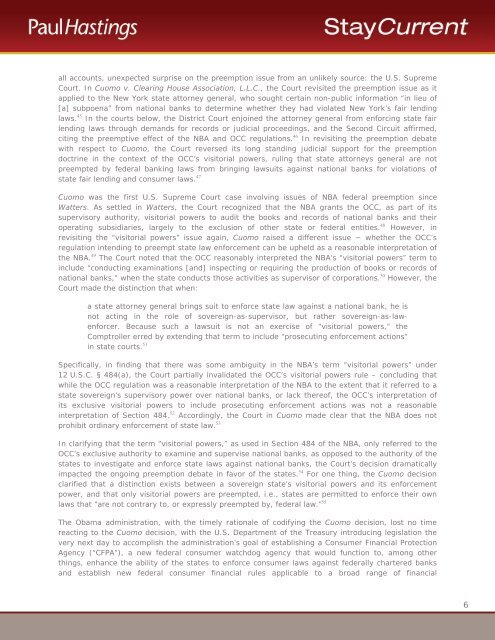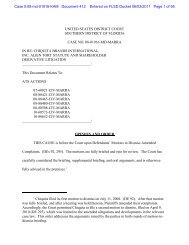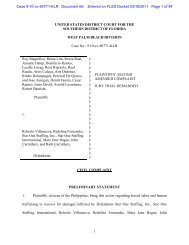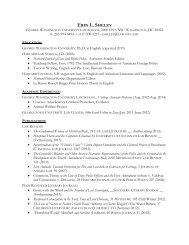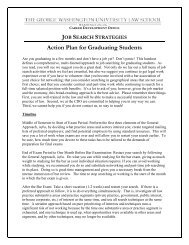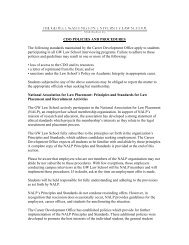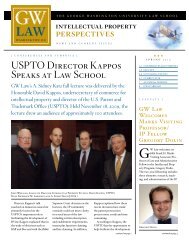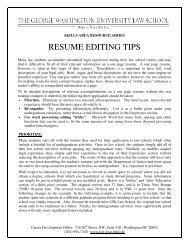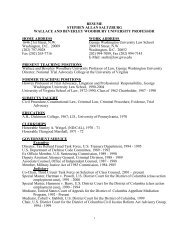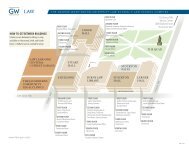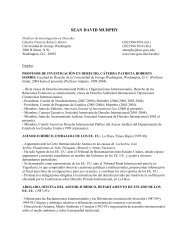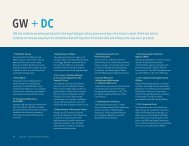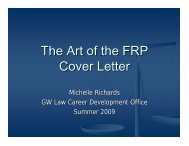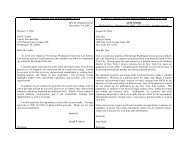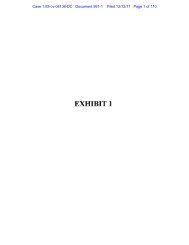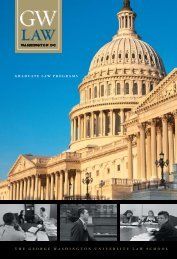CLE Materials for Panel #1 - George Washington University Law ...
CLE Materials for Panel #1 - George Washington University Law ...
CLE Materials for Panel #1 - George Washington University Law ...
You also want an ePaper? Increase the reach of your titles
YUMPU automatically turns print PDFs into web optimized ePapers that Google loves.
all accounts, unexpected surprise on the preemption issue from an unlikely source: the U.S. Supreme<br />
Court. In Cuomo v. Clearing House Association, L.L.C., the Court revisited the preemption issue as it<br />
applied to the New York state attorney general, who sought certain non-public in<strong>for</strong>mation “in lieu of<br />
[a] subpoena” from national banks to determine whether they had violated New York’s fair lending<br />
laws. 45 In the courts below, the District Court enjoined the attorney general from en<strong>for</strong>cing state fair<br />
lending laws through demands <strong>for</strong> records or judicial proceedings, and the Second Circuit affirmed,<br />
citing the preemptive effect of the NBA and OCC regulations. 46 In revisiting the preemption debate<br />
with respect to Cuomo, the Court reversed its long standing judicial support <strong>for</strong> the preemption<br />
doctrine in the context of the OCC’s visitorial powers, ruling that state attorneys general are not<br />
preempted by federal banking laws from bringing lawsuits against national banks <strong>for</strong> violations of<br />
state fair lending and consumer laws. 47<br />
Cuomo was the first U.S. Supreme Court case involving issues of NBA federal preemption since<br />
Watters. As settled in Watters, the Court recognized that the NBA grants the OCC, as part of its<br />
supervisory authority, visitorial powers to audit the books and records of national banks and their<br />
operating subsidiaries, largely to the exclusion of other state or federal entities. 48 However, in<br />
revisiting the “visitorial powers” issue again, Cuomo raised a different issue whether the OCC’s<br />
regulation intending to preempt state law en<strong>for</strong>cement can be upheld as a reasonable interpretation of<br />
the NBA. 49 The Court noted that the OCC reasonably interpreted the NBA’s “visitorial powers” term to<br />
include “conducting examinations [and] inspecting or requiring the production of books or records of<br />
national banks,” when the state conducts those activities as supervisor of corporations. 50 However, the<br />
Court made the distinction that when:<br />
a state attorney general brings suit to en<strong>for</strong>ce state law against a national bank, he is<br />
not acting in the role of sovereign-as-supervisor, but rather sovereign-as-lawen<strong>for</strong>cer.<br />
Because such a lawsuit is not an exercise of “visitorial powers,” the<br />
Comptroller erred by extending that term to include “prosecuting en<strong>for</strong>cement actions”<br />
in state courts. 51<br />
Specifically, in finding that there was some ambiguity in the NBA’s term “visitorial powers” under<br />
12 U.S.C. § 484(a), the Court partially invalidated the OCC’s visitorial powers rule – concluding that<br />
while the OCC regulation was a reasonable interpretation of the NBA to the extent that it referred to a<br />
state sovereign’s supervisory power over national banks, or lack thereof, the OCC’s interpretation of<br />
its exclusive visitorial powers to include prosecuting en<strong>for</strong>cement actions was not a reasonable<br />
interpretation of Section 484. 52 Accordingly, the Court in Cuomo made clear that the NBA does not<br />
prohibit ordinary en<strong>for</strong>cement of state law. 53<br />
In clarifying that the term “visitorial powers,” as used in Section 484 of the NBA, only referred to the<br />
OCC’s exclusive authority to examine and supervise national banks, as opposed to the authority of the<br />
states to investigate and en<strong>for</strong>ce state laws against national banks, the Court’s decision dramatically<br />
impacted the ongoing preemption debate in favor of the states. 54 For one thing, the Cuomo decision<br />
clarified that a distinction exists between a sovereign state’s visitorial powers and its en<strong>for</strong>cement<br />
power, and that only visitorial powers are preempted, i.e., states are permitted to en<strong>for</strong>ce their own<br />
laws that “are not contrary to, or expressly preempted by, federal law.” 55<br />
The Obama administration, with the timely rationale of codifying the Cuomo decision, lost no time<br />
reacting to the Cuomo decision, with the U.S. Department of the Treasury introducing legislation the<br />
very next day to accomplish the administration’s goal of establishing a Consumer Financial Protection<br />
Agency (“CFPA”), a new federal consumer watchdog agency that would function to, among other<br />
things, enhance the ability of the states to en<strong>for</strong>ce consumer laws against federally chartered banks<br />
and establish new federal consumer financial rules applicable to a broad range of financial<br />
6<br />
6


